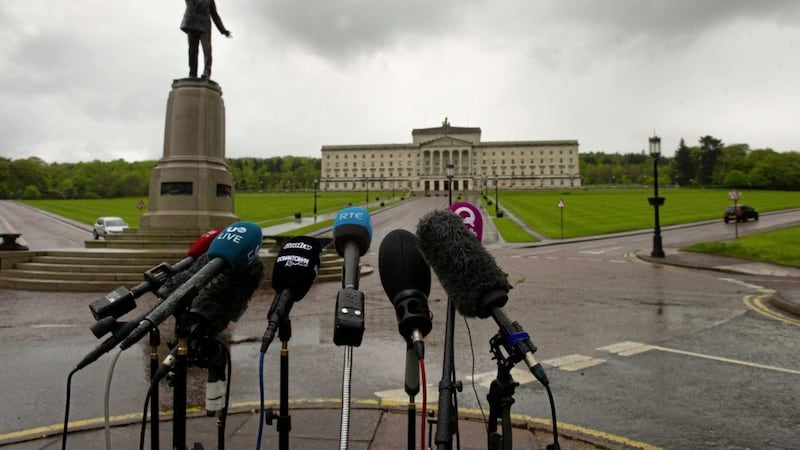The word ‘historic’ is overused in Northern Ireland but elections north and south have marked a turning point in our politics. Sinn Féin is hardly going away but will have to come back with a completely new approach, likely to focus less on constitutional posturing and more on policy delivery. Alliance has made a breakthrough that puts the two communities model on notice. The UUP is the real casualty of last week’s results, losing half its vote and lacking any vision to recover. The fact that its demise is barely registering only underscores the party’s redundancy.
All roads point back to Stormont to shake these developments out and that is clearly the wish of the electorate. But the ugly scaffolding will struggle to cope with a transformed party system. It may take a St Andrews 2 to make Stormont fit for a political realignment that has occurred in its absence - and been provoked by it.
**
With magnificent understatement, Belfast High Court has ruled the arrests of journalists Trevor Birney and Barry McCaffrey over their Loughinisland documentary was “inappropriate, whatever the other arguments.”
This can be translated into English as: “totally outrageous under any circumstances”.
The verdict will be hugely embarrassing for the PSNI and no less embarrassing for Durham Constabulary, which was brought in to conduct the investigation.
It emerged in court the Durham officer responsible for the arrests, which involved a dawn raid by 100 mostly PSNI constables, wrote in his notebook that a man named in the documentary had been “put in danger for merely having the misfortune of being involved in terrorist atrocities”.
It seems that on top of the moral ambiguities of policing in Northern Ireland, Durham added the cultural failings that have made policing in England a matter of public despair. Smashing down journalists’ doors over a health and safety concern for suspected terrorists almost parodies that culture.
The PSNI is about to acquire a chief constable from England. We may hope this does not result in the worst of both worlds.
**
In other judicial review news, Belfast High Court has ruled against the Boundary Commission’s proposals for Northern Ireland’s Westminster constituencies. The court found the Commission “undertook their task assiduously and conscientiously at every stage, quite demonstrably so” but failed to give equal weight to respondents in the three-stage consultation process who did not take part in each stage.
This will be a particular relief to Sinn Féin, which made no submission to the first two stages and only complained about the first two at the third.
**
Judges in Dublin have heard a plea on behalf of John Downey, a former IRA member wanted by prosecutors in Northern Ireland over the murder of three UDR soldiers in 1972. Downey’s barrister argued extradition would be an abuse of process as the prosecution is “doomed to failure” due to “the enormous delay between 1972 and 2018 before any proceedings were brought.”
The court is thus being asked if much of the current debate around dealing with the past in Northern Ireland is pointless.
**
Eileen Paisley, widow of Ian Paisley, has told the BBC a united Ireland would be acceptable to her as long as people were not persecuted for their religion.
This should not be a surprise. For Ian Paisley, the division of Ireland was always about religion, not politics or nationality.
In the rest of her interview, Eileen Paisley lambasted the DUP for going soft on homosexuality, so it is clear her idea of religious freedom is very much of the ‘no gay cake here’ variety.
An interesting question is whether Free Presbyterians en bloc might flip towards nationalism as their estrangement from the DUP grows.
Cranky Calvinists have been the wild card in Irish politics for 400 years.
**
Northern Ireland’s film and television industry is badly exposed to the culture war.
Prominent Hollywood actors have signed a letter vowing to boycott US states with strict abortion laws. Among the signatories is Game of Thrones star Sophie Turner, who was promptly asked why she did not boycott Northern Ireland over its equally strict laws. Turner replied she was glad to have now left.
It can only be a matter of time before the unlawfulness of same-sex marriage here attracts similar attention. Last month, the lack of racial diversity in Northern Ireland was raised by television industry figures after a photo of the Line of Duty crew showed everyone backstage was white.
**
An RTE exit poll reported a ‘green wave’ in the Republic that turned out to be more of a blip. However, counting takes so long in southern elections that by the time the truth was established a narrative had taken hold, senior figures in Fine Gael and Fianna Fail were publicly sizing up the Greens as coalition partners, rumours spread of a general election and Sinn Féin was hugging windmills from Belfast to Cork.
One theory for what went wrong is that exit pollsters usually have to stand at the gates of polling stations, outside any school car park for example, so they disproportionately interview people who decline to drive short distances, who are in turn disproportionately green. Could it really be that simple?
newton@irishnews.com









